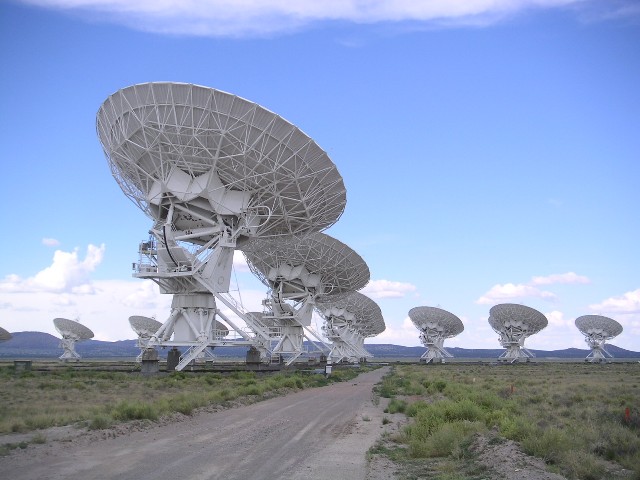
The Possibilities of Extraterrestrials Machinedo and Sagan's Politics Contact (the webpage author, not the Vegans)
|
The Possibilities of Extraterrestrials One of Carl Sagan's largest interests was that of the search for extraterrestrial life. Contact, as a novel looking forward to the discovery of life on other worlds, naturally builds off Sagan's SETI work. At the start of the novel, before the discovery of the Message, the question often posed to the SETI astronomers was “What are the chances of finding little green men?” With a billion stars in the sky and thousands of possible radio frequencies to check, what were the chances that any radio telescope would be looking in the right place at the right frequency at the right time? Compounding the difficulty is the fact that a message would defnitely have to be broadcasting directly to us, as our telescopes are far too weak to pick up the kind of noise shot into space by the alien equivalents of cell phones and radio programs. Drumlin had mentioned that Ellie had searched Vega at Aricebo, and found nothing then. This is, of course, before attempting to guess how many int Contact begins as an attempt to answer the question of "is there anyone out there", and promote reasons for the SETI project to continue. It showcases some arguments prompted by critics of the program. David Drumlin accuses Ellie and the other Argus astronomers that they will never be satisfied with their search. “You'll argue that another Argus facility has to be built... to observe the southern sky. And when that fails, you'll talk about building some paraboloid.... You'll always be able to think of some kind of observation that hasn't been done.” (57) Another astronomer, frustrated at the high priority SETI is given for telescope usage, claims that because the chances of finding aliens are so rare time for the telescope ought to go to other studies that know what they are looking for. However, Ms. Arroway argues for SETI: “If we fail, we learn something of the rarity of intelligent life.... And if we succeed, we hit the cosmic jackpot. There's no greater discovery you can imagine.” (57) She also points out that there's something we can learn instantly, just from contact: that civilizations that build radio telescopes don't immediately blow themselves up soon after. These are just a few of the reasons to keep searching given in the novel. Sagan has argued for many. Among them, he says that scanning the sky can lead to discoveries of many sorts, even if none of them are intelligent. He points to pulsars and quasars as two examples of phenomena accidentally discovered by SETI. Once the Message is received and the world knows that they are not alone, the question then shifts from "who is out there" to "what are they like". The situation changes depending on the system. For example, the Argus scientists correctly hypothesized that there were no proper Vegans, since the star system was too young and filled with debris. The broadcast must have been engineered from a source that had set up a transmission station in Vega. (An example of didactic science fiction in action.) Based on that, it was conceivable that the civilization they had encountered was far more advanced than their own. Ellie argues that this is extremely likely for any contact. Humans have only had the means of communication (radio telescopes) for a few decades. If the extraterrestrials were any younger, they'd have no way of contacting us. It would also be extremely unlikely that they'd be at the exact same level of sophistication as humanity. Therefore any contact would be likely with those more intelligent than ourselves. Beyond that, it's hard to predict the technology levels of any extraterrestrials without either meeting them or having them send us some schematics for a highly advanced engineering project. Other than just technical achievements, the motives of the extraterrestrials are still unknown. Are they friendly? Do they wish to bring us into a new era? Or do they want any new civilizations destroyed immediately to prevent any challengers to their dominion of space? Maybe they are colonists expanding an empire. Maybe they just want to laugh at our backwards ways. These are all tossed around by policy makers and scientists, with many worries and hopes being imposed onto an unknown civilization. Some argue that the Message should be ignored, the radio telescopes destroyed out of fear. However, the more adventurous of the scientists demand that the instructions in the machine be followed, because ignoring them would not only be pointless (if the Vegans were so interested in our deaths they could come over themselves in twenty-six years), but would be shameful and far from the scientific spirit of inquiry. The argument then proposed is that the risks of a meeting with the unknown should be met, to make the unknown known and the unexplored explored. This is something Sagan considers an essential part of science, the seeking of the unknown. That belief pours out into the novel as characters argue for the building of a Machine that will help explore the world.
|
 elligent civilizations are even out there broadcasting off their planet in the first place.
elligent civilizations are even out there broadcasting off their planet in the first place.